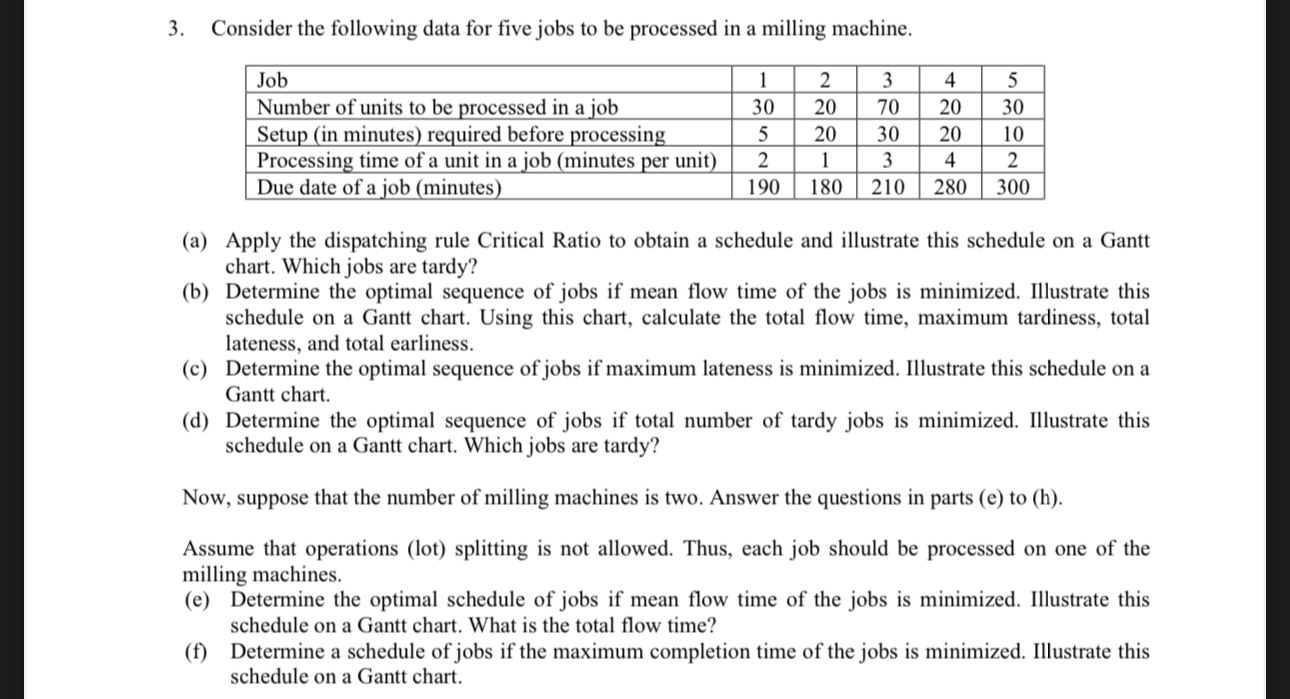Answered step by step
Verified Expert Solution
Question
1 Approved Answer
3. Consider the following data for five jobs to be processed in a milling machine. (a) Apply the dispatching rule Critical Ratio to obtain a
 3. Consider the following data for five jobs to be processed in a milling machine. (a) Apply the dispatching rule Critical Ratio to obtain a schedule and illustrate this schedule on a Gantt chart. Which jobs are tardy? (b) Determine the optimal sequence of jobs if mean flow time of the jobs is minimized. Illustrate this schedule on a Gantt chart. Using this chart, calculate the total flow time, maximum tardiness, total lateness, and total earliness. (c) Determine the optimal sequence of jobs if maximum lateness is minimized. Illustrate this schedule on a Gantt chart. (d) Determine the optimal sequence of jobs if total number of tardy jobs is minimized. Illustrate this schedule on a Gantt chart. Which jobs are tardy? Now, suppose that the number of milling machines is two. Answer the questions in parts (e) to (h). Assume that operations (lot) splitting is not allowed. Thus, each job should be processed on one of the milling machines. (e) Determine the optimal schedule of jobs if mean flow time of the jobs is minimized. Illustrate this schedule on a Gantt chart. What is the total flow time? (f) Determine a schedule of jobs if the maximum completion time of the jobs is minimized. Illustrate this schedule on a Gantt chart
3. Consider the following data for five jobs to be processed in a milling machine. (a) Apply the dispatching rule Critical Ratio to obtain a schedule and illustrate this schedule on a Gantt chart. Which jobs are tardy? (b) Determine the optimal sequence of jobs if mean flow time of the jobs is minimized. Illustrate this schedule on a Gantt chart. Using this chart, calculate the total flow time, maximum tardiness, total lateness, and total earliness. (c) Determine the optimal sequence of jobs if maximum lateness is minimized. Illustrate this schedule on a Gantt chart. (d) Determine the optimal sequence of jobs if total number of tardy jobs is minimized. Illustrate this schedule on a Gantt chart. Which jobs are tardy? Now, suppose that the number of milling machines is two. Answer the questions in parts (e) to (h). Assume that operations (lot) splitting is not allowed. Thus, each job should be processed on one of the milling machines. (e) Determine the optimal schedule of jobs if mean flow time of the jobs is minimized. Illustrate this schedule on a Gantt chart. What is the total flow time? (f) Determine a schedule of jobs if the maximum completion time of the jobs is minimized. Illustrate this schedule on a Gantt chart Step by Step Solution
There are 3 Steps involved in it
Step: 1

Get Instant Access to Expert-Tailored Solutions
See step-by-step solutions with expert insights and AI powered tools for academic success
Step: 2

Step: 3

Ace Your Homework with AI
Get the answers you need in no time with our AI-driven, step-by-step assistance
Get Started


